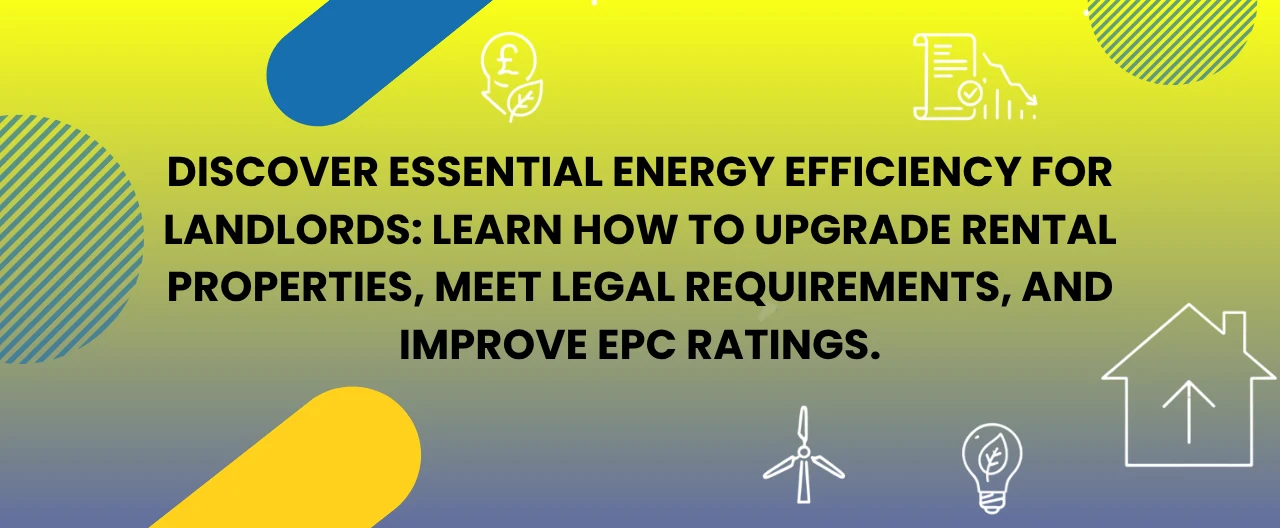
Essential Energy Efficiency for Landlords: Guide to Meeting Minimum Standards
Energy efficiency for landlords is crucial. Why so? Several reasons, including meeting legal requirements, making properties more attractive to tenants, and increasing property value. Which is why about 80% landlords in the UK prefer stricter energy efficiency rules on their properties. And you, as a responsible landlord, need to ensure that you do the same. Therefore, you need to realize why energy efficiency is important and gain essential knowledge on this matter in order to ensure proper compliance with the law.
For that, in this blog, we will have an in-depth discussion on energy efficiency for landlords, covering essential facts such as new EPC regulations, minimum energy efficiency standards, EPC certificate for landlords, etc. So, join in and take notes on the guidelines.
- Why is Energy Efficiency Important for Landlords?
- What Are the New EPC Regulations for Landlords in 2025 and beyond?
- What Are the Minimum Energy Efficiency Standards for Rental Properties?
- How to Obtain and Understand an EPC Certificate for Your Rental Property
- How can landlords improve energy efficiency for rental properties?
- How Can Landlords Cost-Effectively Improve Energy Efficiency Ratings?
- What financial support is available for landlord energy efficiency improvements?
- How to Market Your Energy-Efficient Property to Potential Tenants
- Energy Efficiency and Comprehensive Property Safety
Table of Content
Why is Energy Efficiency Important for Landlords?
If you are a landlord, a lack of energy efficiency can be a real headache. Let's kick things off by figuring out why energy efficiency is such a big deal for landlords.
How Energy Efficiency Affects Property Value and Rental Potential
A property’s market value often depends on energy efficiency. Yes, you heard that right, energy efficiency plays a crucial role in the UK in terms of determining a property’s market value and rental appeal. Which is why energy efficiency for landlords is quite a serious matter that needs to be taken with immense importance. Let’s get some solid reasons behind it.
Properties that are energy-efficient attract higher property values because buyers seek lower running costs and modern sustainability standards. Plus, rental demand increases because tenants prefer homes with lower utility bills and comfortable living conditions. Also, a better Energy Performance Certificate (EPC) that has a rating A–C can help in boosting rent levels and reducing vacancy rates.
Let’s talk about the flip side for a second. If your property has a poor energy rating- think E or below- you could actually run into legal rental restrictions under the MEES rules. That’s a headache you don’t want!
The point is, efficiency really helps you with three key things:
Getting renters:
Good ratings make your property much more appealing.
Future-proofing your investment:
It holds onto its value for the long haul.
Keeping things legal:
You're always on the right side of those environmental regulations as they change.
The deal is this: energy efficiency isn't just a bonus; it's non-negotiable. It'll bump up your property value, yes, but more importantly, it makes sure you're compliant and bringing in profit for years down the road.
Environmental Benefits of Energy-Efficient Rental Properties
So, what are the environmental benefits of energy-efficient rental properties? There are actually quite a few.
Essentially, these properties help the UK reach its environmental goals by cutting down on carbon emissions and our reliance on fossil fuels. Upgrades that are easy to do, like better insulation, energy-efficient appliances, or even solar panels, mean less pollution and waste. Look! To put it simply, you can’t lose because it’s a win-win. You help the UK with its big environmental goals and easily snap up those tenants who are already into green living. Best of all, they improve the air quality inside, making for healthier homes for your renters.
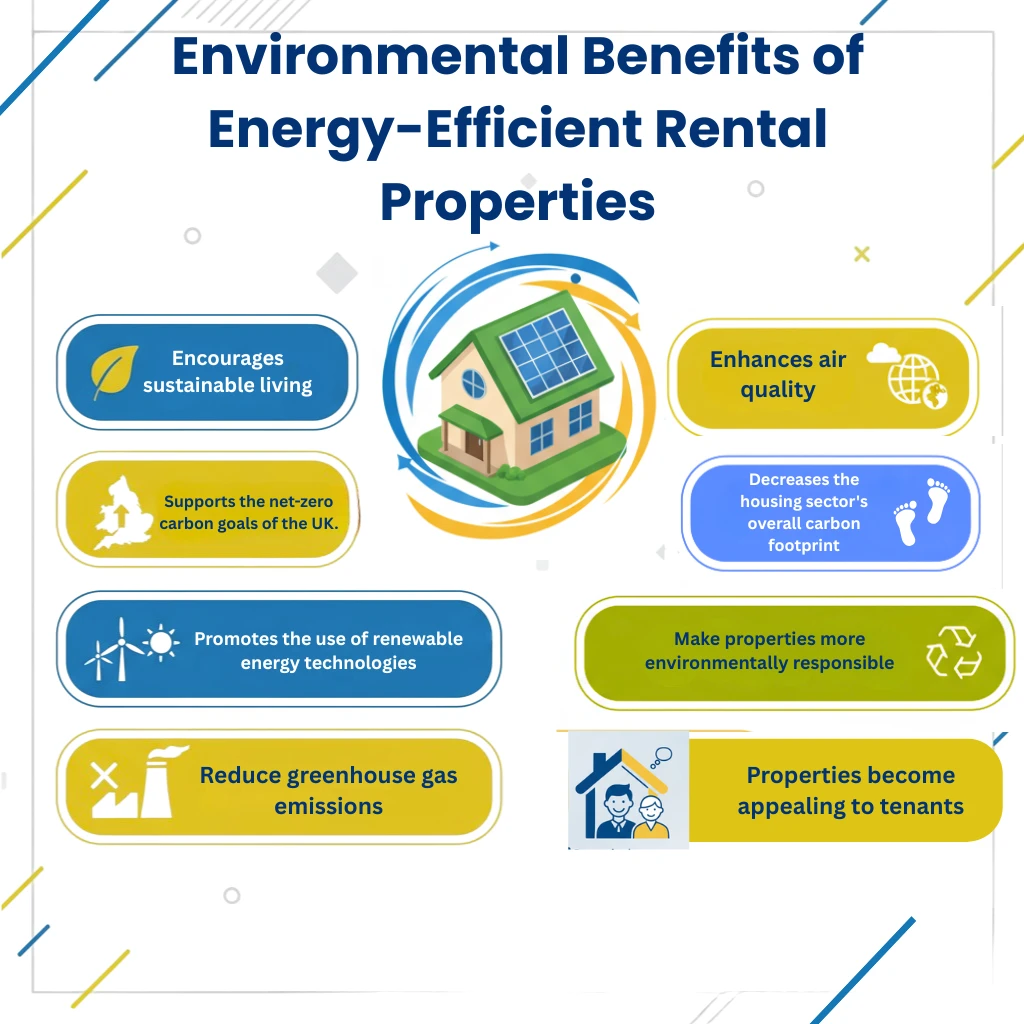
- Highly encourages sustainable living.
- Supports the net-zero carbon goals of the UK.
- Promotes the use of renewable energy technologies, such as solar panels and efficient insulation.
- Helps in reducing greenhouse gas emissions by lowering energy consumption and reliance on fossil fuels.
- Enhances air quality by reducing pollution from heating systems.
- Decreases the housing sector's overall carbon footprint.
All these ultimately make properties more environmentally responsible and socially appealing to tenants, especially those who are eco-conscious.
Financial Incentives for Landlords Who Improve Energy Efficiency
Landlords who improve energy efficiency gain some great financial benefits. As a Landlord, do you want to benefit financially from making your properties greener? You absolutely can.
![]() You can get started by checking out government programs like ECO4 scheme and the Boiler Upgrade Scheme– they literally give you grants to help cover expensive stuff like insulation, heating upgrades, and renewable installations. You don’t have to front the whole bill.
You can get started by checking out government programs like ECO4 scheme and the Boiler Upgrade Scheme– they literally give you grants to help cover expensive stuff like insulation, heating upgrades, and renewable installations. You don’t have to front the whole bill.![]() Plus, you get a break on the costs with reduced VAT for those materials and handy tax relief incentives. It makes the upgrades much more affordable.
Plus, you get a break on the costs with reduced VAT for those materials and handy tax relief incentives. It makes the upgrades much more affordable.![]() Reduced VAT on energy-saving materials and tax relief incentives help lower renovation costs.
Reduced VAT on energy-saving materials and tax relief incentives help lower renovation costs.![]() Increased rental income potential due to improved EPC ratings. An improved EPC rating not only increases property value but can also justify higher rental prices and reduce long-term maintenance expenses.
Increased rental income potential due to improved EPC ratings. An improved EPC rating not only increases property value but can also justify higher rental prices and reduce long-term maintenance expenses.![]() Lower long-term maintenance and energy costs.
Lower long-term maintenance and energy costs.![]() Enhanced property value and future-proofing against regulatory penalties for non-compliance with energy standards.
Enhanced property value and future-proofing against regulatory penalties for non-compliance with energy standards.
What Are the New EPC Regulations for Landlords in 2025 and beyond?
Now, we will discuss the new EPC regulations for landlords in 2025 and beyond.
Changes to Energy Efficiency Requirements Coming in 2025
Okay, so now we are going to discuss the new EPC regulations that landlords need to know about.
Get ready, because from 2025, the UK is introducing much stricter energy efficiency standards. It's all part of the effort to reach net-zero goals. The most important things are:
- All newly rented properties are expected to meet a minimum EPC rating of C, replacing the previous E requirement.
- This change aims to reduce energy waste, cut emissions, and lower tenant energy costs.
- Landlords have to upgrade insulation, heating systems, and lighting to comply.
- Financial support schemes can help cover your retrofit costs, but don't get complacent. Not following the rules could lead to rental restrictions or fines.
Ultimately, all these changes reflect the government’s big push for a greener, more efficient housing market. The end result? Sustainable, cheaper-to-run homes for tenants, which is great for everyone—and the planet.
Preparing for 2030 Energy Efficiency Standards
New EPC regulations for landlords in 2030:
- By 2030, every single rental property in the UK will need to achieve at least an EPC rating of C. It's a non-negotiable target.
- Landlords really should start assessing their buildings right now. Upgrading things like insulation, windows, and heating systems now lets you spread the costs out over time.
- Adopting renewable technologies like heat pumps and solar panels can future-proof properties. Focus on the core stuff: improving your insulation, windows (glazing), boilers, and looking into renewable energy systems.
- Getting an energy audit and EPC assessment is smart; they'll actually pinpoint the exact weak areas that need fixing.
- Investing in solar panels, heat pumps, and smart energy controls helps future-proof homes.
- Complying early is a smart move. It boosts your property value, attracts better tenants, and saves you money for the long haul—all while helping out with sustainability goals.
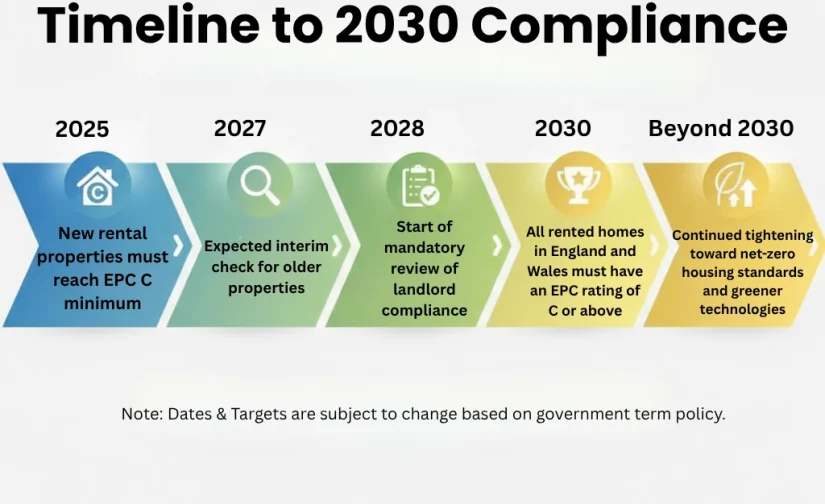
Are the Rumors True: New EPC Regulations 2025 Scrapped?
“New EPC regulations 2025 scrapped” —you’ve likely already heard the rumor that the government paused the 2025 EPC upgrade requirement because of cost concerns from landlords. Well, you heard right—the initial timeline has been softened.
However, don’t get too comfortable. The long-term goal of hitting an EPC C rating by 2030 is still very much in place. The government still strongly encourages landlords to improve energy efficiency through grants and incentives. Therefore, rather than being scrapped, the 2025 regulations are being phased out and adjusted, giving landlords more flexibility while keeping the net-zero commitment intact.
What Are the Minimum Energy Efficiency Standards for Rental Properties?
Now, we will learn about the minimum energy efficiency standards for rental properties.
Current Legal Requirements for Landlord Energy Efficiency
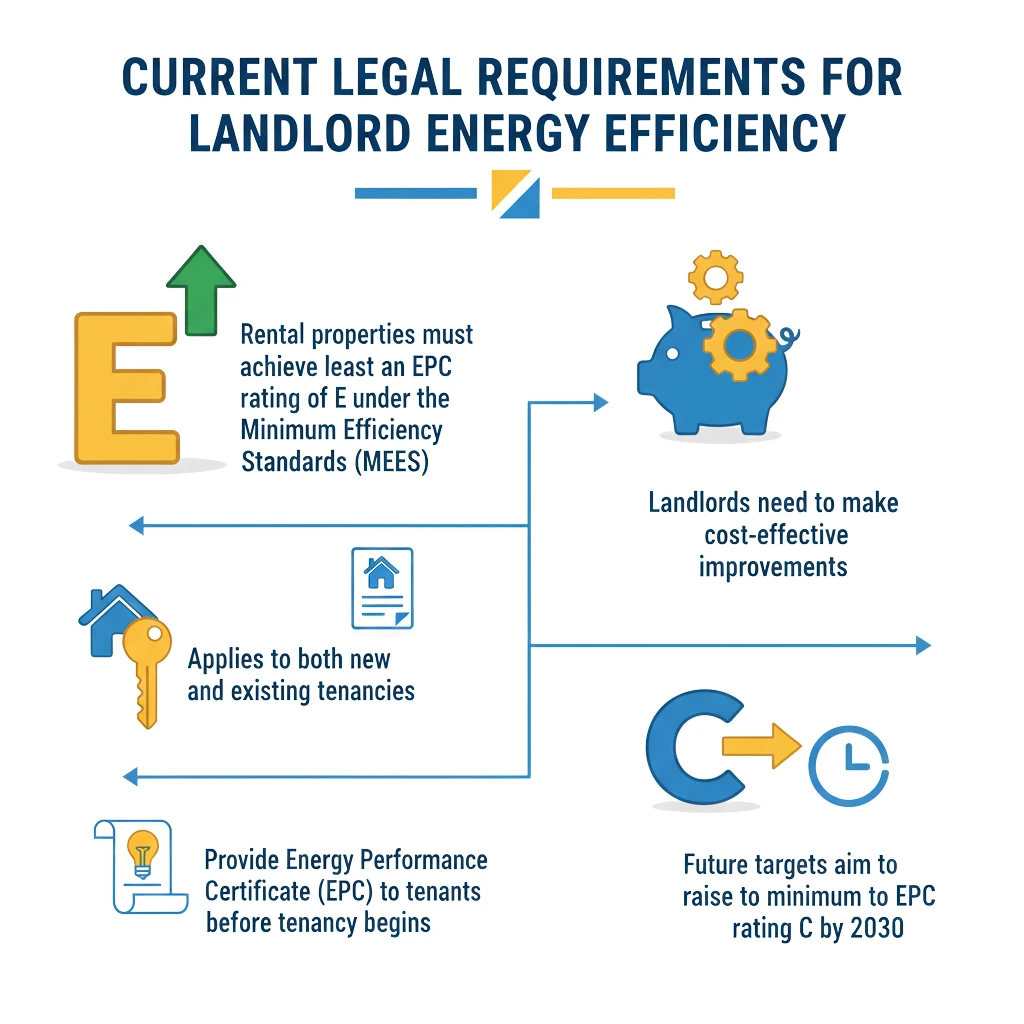
Landlords have to ensure that their rental properties meet a minimum Energy Performance Certificate (EPC) rating of E under the Minimum Energy Efficiency Standards (MEES). And get this: the legal energy efficiency requirements for landlords apply to both new and existing tenancies throughout England and Wales.
In addition, the EPC needs to be valid, and landlords have to provide it to tenants at the start of the tenancy. Plus, landlords are legally required to make cost-effective improvements, such as upgrading insulation or heating systems, if their property falls below this threshold.
The future regulations have a clear goal: to raise the minimum standard to EPC C by 2030. They want to encourage better energy performance and reduce carbon emissions across all private rental properties.
Penalties and Consequences for Non-Compliance
Fines:
Local councils can hit you with up to £5,000 per property for not complying!
Rental bans:
You could even be barred from letting substandard properties until you make the necessary improvements.
Reputation hit:
Plus, ignoring the rules can really damage your reputation and property value.
Tenant trouble:
Watch out, as they could seek compensation or report you to the authorities.
We can say in short:
- Local authorities enforce fines, civil penalties of up to £5,000 per property.
- Prohibit landlords from renting out non-compliant homes.
- Continuous non-compliance can result in loss of rental income and reputational harm.
- Tenants can report violations and seek remedies if living in inefficient properties.
Maintaining a compliant EPC rating is crucial because it protects landlords from legal risks and also ensures ongoing rental eligibility within the housing market of the UK.
Exemptions to Energy Efficiency Standards for Landlords
There are certain properties that qualify for MEES (minimum energy efficiency standards) exemptions under UK law. Landlords are allowed to apply for an exemption to energy efficiency standards. However, it comes with certain conditions. Landlords can apply for an exemption:
- If improvement costs exceed £3,500 (inclusive of VAT)
- Or, if upgrades negatively impact the building’s structure or heritage, such as listed buildings or conservation areas.
- Other exemptions apply if the tenant consent for works is refused.
- Or, if all possible improvements have been made, but the property still fails to reach EPC E.
Also, keep in mind that exemptions need to be registered on the PRS Exemptions Register, and it will remain valid for 5 years. Landlords have to retain evidence in order to justify their exemption and renew it when necessary.
How to Obtain and Understand an EPC Certificate for Your Rental Property
Let’s discuss obtaining and understanding an EPC certificate for landlords for rental property.
What is an EPC, and Why Do Landlords Need It?
So, you have been hearing about the term “EPC,” now, learn what it actually is. EPC is short for Energy Performance Certificate. It is an official document that assesses a property’s energy efficiency rating. Rating it from A (most efficient) to G (least efficient), where A stands for “most efficient and G stands for “least efficient.”
Here in the UK, it is legally required that all landlords provide a valid EPC to their tenants when a property is marketed or let. An Energy Performance Certificate (EPC) does more than just ensure you’re compliant with MEES regulations. The certificate doesn’t just show tenants their potential energy costs; it also:
Highlights what to fix:
It points out weak spots in your property so you know exactly what needs improving.
Makes planning easy:
It basically tells you exactly what needs fixing, which helps you plan your upgrades and your budget without a headache.
Makes your property stand out:
A good rating boosts your property's appeal to tenants, which can lead to higher rents and fewer vacancies.
Supports the big picture:
You're helping with sustainability goals and protecting the environment.
Avoids legal headaches:
It basically shows you the rules, which helps you avoid those nasty fines and rental restrictions later on.
How to Interpret Your EPC Rating and Recommendations
Now you know what an EPC is, let’s move on to learning how to interpret an EPC rating and recommendations.
EPCs display both a letter rating and a numerical score.
To indicate the energy efficiency of a property, the EPC displays both:
- A letter rating score (A-G)
- A numeric score
In EPC rating, the higher the score (closer to band A), the more efficient the property.
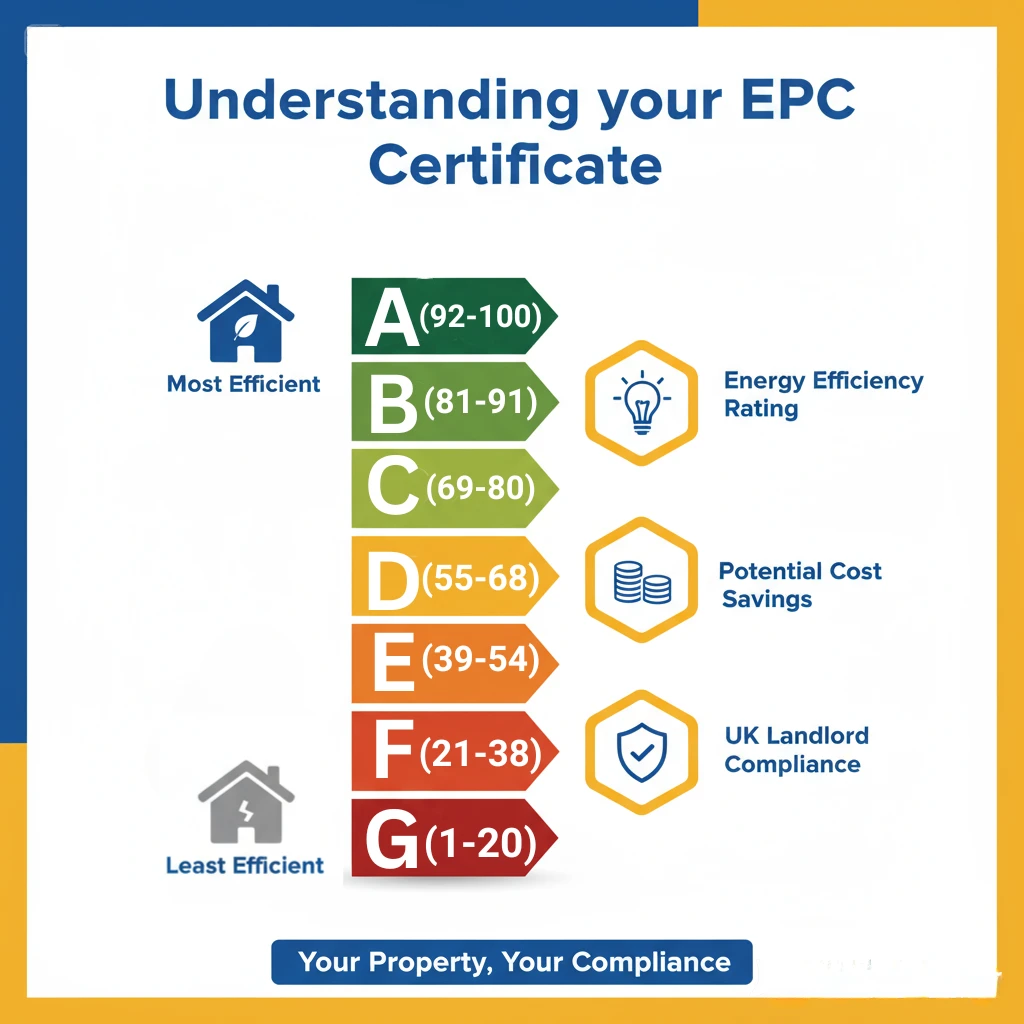
The accompanying recommendations section outlines practical steps to improve efficiency, such as:
- Adding insulation
- Upgrading boilers
- Installing double-glazed windows
- Adopting renewable technologies.
Each recommendation typically includes estimated costs and potential energy savings, providing landlords with a roadmap to reduce bills and carbon emissions. Landlords can use the recommendations to prioritise upgrades that will improve tenant comfort, lower running costs, and increase rental appeal.
Moreover, it is essential to treat the EPC as a roadmap rather than a guarantee. Actual savings depend on how the property is managed and used. In addition, interpreting the EPC helps prioritize improvements strategically. It makes sure that the most cost-effective and impactful upgrades are undertaken, enhances tenant comfort, increases rental appeal, and potentially raises the property’s market value.
Validity Period and Renewal Process for EPC Certificates
EPCs are valid for 10 years in England and Wales from the date they are issued.
Landlords must give a current certificate at the start of any rental or property sale. If you make big changes, like getting a new boiler, adding insulation, or installing renewable energy, you should get a new EPC to show how much more energy-efficient the building is.
So, to renew, you need to hire a qualified domestic energy assessor to look at the property and file the certificate with the national register. Keeping EPCs up to date makes sure the law is followed, raises the value of the property, and lets tenants know how energy-efficient it is and how much money they could save.
To EPC renew:
- Engage an accredited domestic energy assessor
- book a survey
- The assessor lodges the certificate with the national register
- Finally, you receive a digital copy
Case Studies of London Landlords Successfully Achieving EPC Improvements
These examples show that with planned investment and suitable technology upgrades, landlords can move well beyond minimum compliance to high-efficiency ratings — improving both asset value and tenant satisfaction.
1
Case study
- Pilot retrofit project
- EPC rating improvement: D to B
In June 2025, Skipton Building Society reported that a pilot home retrofit where the EPC rating improved from D to B after installing measures like:
- an air-source heat pump
- solar panels
- battery storage
- triple glazing
- cavity wall insulation
- Ventilation updates
A thorough study compared the changes of improvements in in energy efficiency and carbon footprint before and after the retrofit. This case shows the level of works required for a large jump in rating (D to B) and can serve as a benchmark.
2
Case study
- The “Abbey Road anomaly”
- EPC ratings improvement: E to B
Sarah identified a dilapidated three-bed terraced house in Abbey Wood, South East London (SE2), in early 2023. It was originally rated EPC E. Sarah's objective was to increase her net rental income while also capitalizing on potential capital development opportunities outside of the more crowded central London markets she already owned.
After undergoing renovation and energy-efficiency upgrades, which were part of a “Buy, Refurbish, Refinance, Rent” strategy, the property achieved an EPC rating of B, positioning it well for future-proofing against upcoming standards.
Key takeaways from these 2 case studies:
- Major retrofit investment ≠ only marginal upgrade
- High ambition can deliver a big uplift
- A high EPC rating upgrade can improve rental appeal and asset value
Significant investment in retrofitting, for instance, in buildings for energy efficiency, should not be assumed to result in only minor, incremental improvements. Instead, suppose the investment is paired with a high level of ambition. Meaning, a comprehensive, bold, and forward-thinking plan. In that case, it can lead to a major, transformative improvement; a "big uplift," and not just a minor one. And upgrading to a high EPC rating can improve rental appeal and asset value in London’s private rented sector.
How can landlords improve energy efficiency for rental properties?
Let’s discuss ways in which landlords can improve energy efficiency for rental properties.
Cost-effective energy efficiency upgrades for rental properties
For landlords in the UK, improving energy efficiency doesn’t always mean expensive renovations. Cost-effective upgrades can significantly reduce energy bills and enhance EPC ratings, too. Simple measures can yield noticeable savings. What kinds of simple measures? For example
- Installing LED lighting
- Draught-proofing door and windows
- Fitting low-flow taps or showerheads
In addition, replacing inefficient appliances with energy-efficient models and utilizing timers or thermostats for heating and hot water also yields financial and environmental benefits.
These small-scale changes are cheap, easy to make, and often get government grants. They are a good first step for landlords who want to make their properties more efficient without spending a lot of money up front.
Insulation and heating system improvements
One of the best ways to improve energy performance is to upgrade the insulation and heating systems in a rental property.
- Loft insulation keeps homes warmer and reduces energy bills.
- Insulating the walls and floors of a building keeps heat from escaping through its structural parts.
- Replacing old boilers with high-efficiency condensing boilers or air-source heat pumps can also improve EPC ratings and reduce carbon emissions.
- For older properties, combining insulation upgrades with modern radiators, thermostatic controls, and programmable timers ensures optimal heating performance.
- A combined approach, such as pairing insulation with efficient heating, can maximise energy savings and tenant comfort.
With these improvements, landlords can not only make their properties more comfortable and attractive to tenants, but they can also show that they are following the UK's Minimum Energy Efficiency Standards (MEES).
Smart technology solutions for better energy management
Energy efficiency for landlords involves utilizing smart technology solutions for improved energy management.
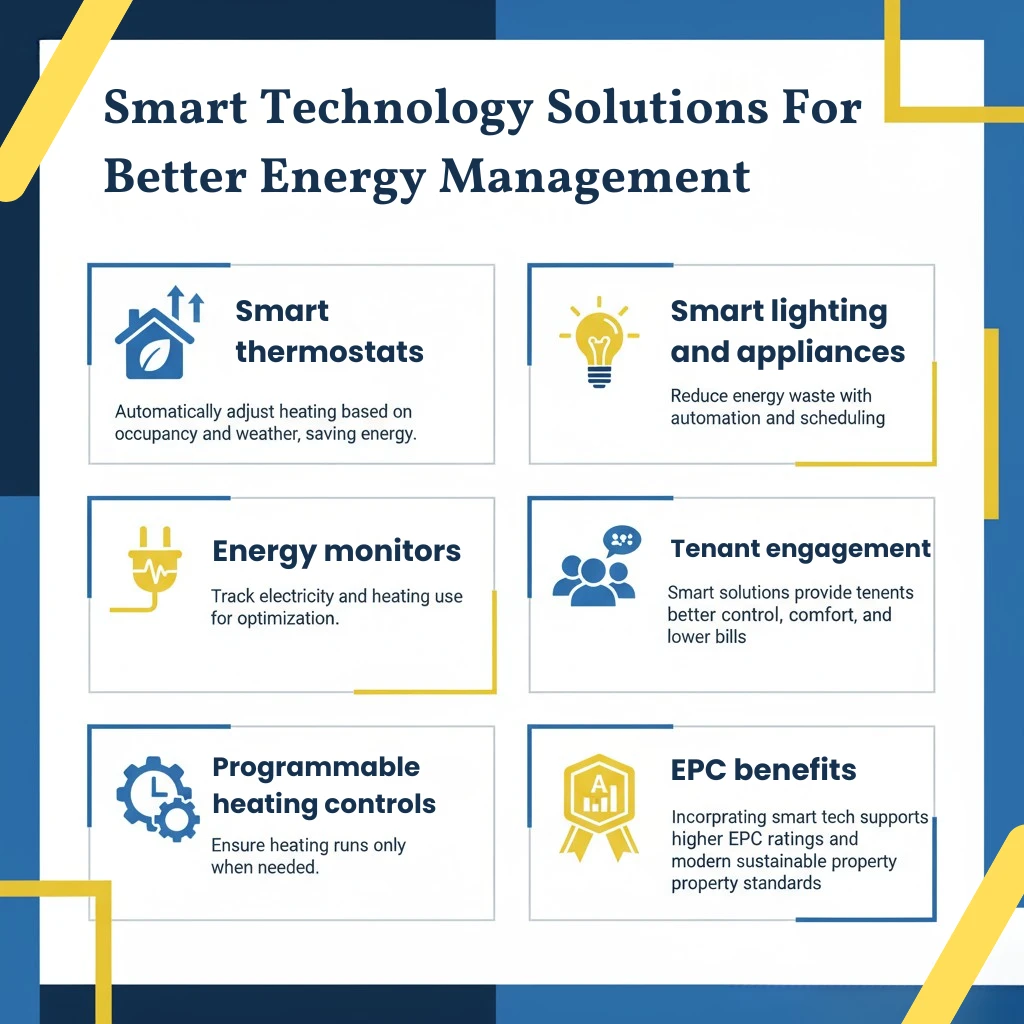
Smart technology provides landlords with an innovative way to manage energy efficiently. Installing:
- smart thermostats
- energy monitors
- programmable heating controls
-allows landlords and tenants to track energy use and optimise consumption.
Some smart heating systems can automatically adjust the temperature based on whether people are home, the weather outside, or the time of day—cutting down on wasted energy.
For even more efficiency, you can look into smart lighting, appliances, and energy monitors.
What’s the real benefit? It’s more than just money. These solutions give your tenants more control over their comfort and energy bills, which keeps them really happy. As a bonus, it boosts your property’s appeal, helps you get a better EPC rating, and aligns your rentals with today’s sustainable expectations.
How Can Landlords Cost-Effectively Improve Energy Efficiency Ratings?
Let’s move on to how landlords can cost-effectively improve energy efficiency ratings.
Quick and Budget-Friendly Energy Efficiency Upgrades
Did you know you can make a noticeable impact on energy efficiency without huge renovations or high costs? It's true! Small fixes can make a huge impact:
- Stop those pesky draughts around windows and doors.
- Seal up any little gaps you can find.
- Switch to LED lighting throughout the property.
- Stick reflective panels behind your radiators.
These easy steps will cut heat loss and energy bills fast. For more simple wins with minimal investment, consider swapping to low-flow showerheads and taps, or using programmable thermostats.
All these fast, cost-effective upgrades not only help in enhancing tenant comfort but can also improve a property’s EPC rating. Also, helping landlords stay compliant with the Minimum Energy Efficiency Standards (MEES)
Selecting Energy Efficient Appliances for Rental Properties
Landlords should look for products with top-tier energy ratings (like A++ or higher). Why? Because they use less electricity and water, which means lower bills for your tenants.
When you’re buying things like fridges, washing machines, dishwashers, and boilers, think carefully about both efficiency and durability. Modern, energy-efficient appliances make your property way more appealing to tenants and help boost that crucial EPC rating.
Plus, investing in efficient devices saves everyone money in the long run while making your property greener. Over time, investing in energy-efficient devices provides financial savings while supporting the property’s environmental credentials.
Grants and Funding Available for Energy Efficiency Improvements
The UK government is providing several schemes that are designed to help landlords in boosting their properties' efficiency, which are worth checking out. Programs such as:
- ECO4, which stands for Energy Company Obligation
- The Boiler Upgrade Scheme
- Local council grants
-offer financial support for:
- Insulation
- Heating system upgrades
- Renewable energy installations.
Some grants cover partial or complete costs of energy-saving measures. And it helps in making compliance with MEES and EPC improvements more achievable. On top of that, you might qualify for tax incentives and low-interest loans, especially for larger retrofits. Leveraging these options lets you make those big improvements without as much upfront cash, which enhances your property's value and its energy performance.
What financial support is available for landlord energy efficiency improvements?
Let’s find out about the support that is available for landlord energy efficiency improvements.
Government grants and incentives for energy upgrades
Let’s talk about how the UK government can actually help you out with making your rental properties more energy efficient. They’ve got a bunch of grant schemes running that are designed to take some of the sting out of the upgrade costs for landlords like us.
Various grant schemes are available to landlords to help with the costs of upgrading rental properties to be more energy efficient
Here's a look at what might be essentially available:
ECO4 (Energy Company Obligation):
Energy suppliers contribute to funding essential improvements such as insulation, new heating systems, and renewable energy installations.
Boiler Upgrade Scheme:
This scheme can assist with the installation costs for low-carbon heating systems, like heat pumps.
Local Council Initiatives
Local councils often have their own specific programs, such as the Warm Homes: Local Grant and the Home Upgrade Grant (HUG). These are often aimed at properties with low EPC ratings or for tenants with lower incomes.
These schemes can help to reduce upfront costs for upgrades, make it easier to meet government regulations, and improve a property's EPC rating. This can lead to benefits such as warmer tenants and a potentially more valuable property.
Tax benefits for energy-efficient rental properties
Investing in energy efficiency isn’t just good for the environment or your tenants; it can also provide you with some valuable tax benefits.
You might be surprised to know that there are incentives to help ease the financial burden and make those upgrades even more attractive.
Here's a jotting down of what you might be able to claim as tax benefits:
Enhanced Capital Allowance (ECA):
This is a great one! It essentially allows you to claim 100% tax relief on the cost of qualifying energy-saving equipment in the same year you buy it.
Landlord’s Energy Saving Allowance (LESA):
You can also claim tax relief for certain types of energy efficiency improvements you make to your properties.
Green Homes Grant:
You can't get new vouchers anymore, but if you made improvements under the old scheme, those improvements will still save you money in the long run.
In the end, these tax breaks and deductions are all about lowering your costs so that you can buy properties that are better for you and your tenants. Before you invest, make sure you check the latest government advice or talk to a tax expert to make sure you qualify for the current reliefs.
Return on investment for energy efficiency measures
Thinking about investing in energy efficiency upgrades? Well, it turns out they can actually offer some pretty sweet returns for you as a landlord. It's not just a 'nice to have'—it makes real business sense.
Here’s how these upgrades can pay off for you:
Bump up your property value:
Homes with better Energy Performance Certificate (EPC) ratings are worth more. The National Residential Landlords Association (NRLA) suggests that higher ratings can increase your property's value by over 20%!
Command higher rent:
Energy-efficient homes are a hot commodity with tenants right now. You could achieve rental premiums of up to 10%, according to the NRLA. Tenants are increasingly looking for homes that are cheaper to run.
Slash those energy bills:
A better-rated property means happier tenants with lower bills. Upgrading a property from an EPC rating of E to a C could reduce energy bills by up to 40% – that's a massive saving that increases tenant satisfaction and retention.
Ultimately, making these improvements not only keeps your tenants happy and comfortable but also ensures you're compliant with future regulations, securing your long-term rental income and protecting your investment.
How to Market Your Energy-Efficient Property to Potential Tenants
Moving on to discuss ways of how you can market your energy-efficient property to potential tenants.
Highlighting Energy Efficiency Features in Rental Listings
When you're marketing a rental property here in the UK, shouting about its energy efficiency features can seriously make it stand out. Tenants are increasingly interested in homes that are not only comfortable but also affordable to run.
Here’s how these upgrades can pay off for you:
EPC rating:
Be proud of it! Clearly state the property’s energy performance certificate band right up front.
Insulation quality:
Mentioning that the loft, walls, or floors are well-insulated instantly tells a tenant the home will be warmer and quieter.
Upgraded heating systems:
Tell people that you have a new boiler, a heat pump, or efficient radiators. People love the idea of lower bills and reliable heating.
Double-glazed windows:
Stress that this means less noise from outside and better temperature control.
Energy-efficient appliances:
LED lights, washing machines, and refrigerators are just a few examples of small things that can help you save money on your utility bills.
Make sure to include all of this great information in your online listings, brochures, and virtual tours. It's important to let potential tenants know that your property is modern, eco-friendly, and, most importantly, cheap to live in. This not only makes your property shine in a crowded market but also attracts those ideal eco-conscious tenants who really value comfort and saving money on bills
How to Explain Energy Cost Savings to Prospective Tenants
When showing a property, it's really helpful to make energy efficiency 'real' for potential tenants. Don't just list the features; show them how it translates into actual savings.
- Use data from the property's EPC and compare it to typical bills for less efficient homes to give them estimated monthly savings on heating, electricity, and water
- To make it super clear and compelling, use visual aids – maybe a simple chart in a brochure or an infographic on the listing. These visuals help prospective tenants literally see the financial benefit.
- It’s all about emphasizing the lower running costs and the extra comfort. We can point out the consistent heating and fewer draughts, which helps them feel reassured that they’re getting both financial and lifestyle advantages.
By doing this, you're not just renting a house; you're offering peace of mind, comfort, and more money in their pocket each month.
Using Energy Efficiency to Justify Premium Rental Rates
Let’s talk about another essential subject regarding energy efficiency for landlords; and that is about charging a bit more rent for your energy-efficient properties. It makes sense, really. Because the homes that have lower running costs, are more comfortable, and appeal to environmentally-aware tenants, you can actually justify a premium rental rate from those
Let’s see how you, as a landlord can frame it:
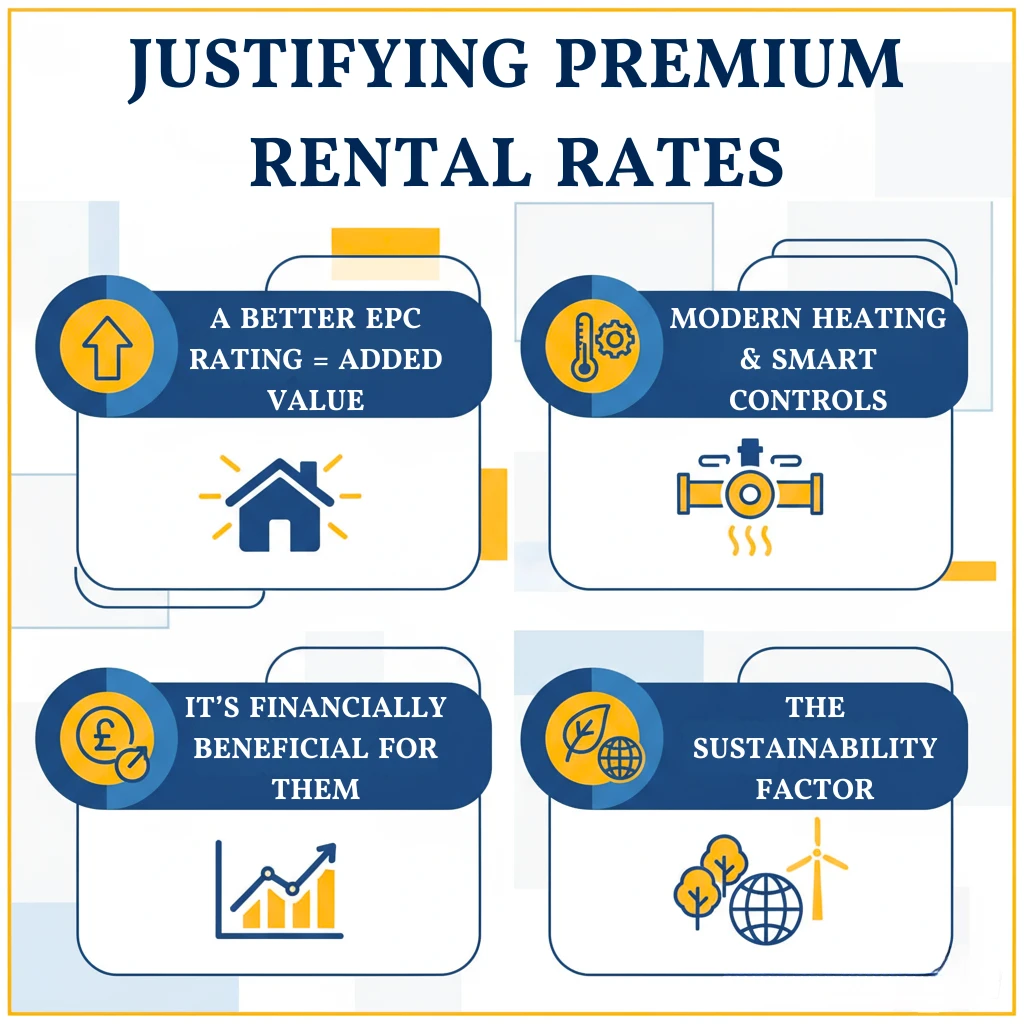
A better EPC rating = added value:
Be upfront about that high EPC rating. It means that the tenant will pay less, which helps explain why the rent is a little higher.
Modern heating and smart controls:
Make sure to mention that you have smart controls or a modern heating system. This isn't just about being comfortable; it's also about using less energy and giving them more power.
It's good for them financially:
Tell them that the money they save on lower bills can help make up for the slightly higher rent.
The sustainability factor:
People care more about the environment these days. Eco-conscious tenants are often willing to pay a premium for a greener property that helps them reduce their carbon footprint.
By integrating energy efficiency into all your marketing and tenancy discussions, you can enhance your revenue while also promoting properties that are better for the planet.
Energy Efficiency and Comprehensive Property Safety
Now, in this final section, we will go over the energy efficiency and comprehensive property safety. We will cover:
Fire Safety Considerations in Energy-Efficient Insulation
When you’re making a home cozy and energy-efficient with new insulation, you’re also adding a hidden layer of responsibility: fire safety. A home upgrade is only safe if it’s fire-safe, which is why fire safety for landlords is a crucial point!
According to UK Law, every material and every installation has to play by the rules set out in Building Regulations Part B. This isn’t optional—it’s the law. It ensures the materials themselves are fire-resistant and that they are put in properly so they don’t become a hazard.
Also, never compress insulation near hot elements (like electrical wires or lighting); this traps heat and creates a major fire risk. Use certified fire barriers and intumescent products in cavities. Regular inspection and proper installation reduce the risk of fire while maintaining thermal performance, ensuring tenants’ safety and compliance with legal obligations under the Housing Health and Safety Rating System (HHSRS).
Electrical Safety and Energy-Efficient Heating Systems
It's great that modern heating systems like heat pumps, electric boilers, and contemporary storage heaters are not only energy-efficient but also built with safety in mind for UK homes.
For ensuring electrical safety for landlords, here’s a jotting down of how it all works:
Safety first:
All installations must follow strict UK electrical safety rules (known as BS 7671).
The right people for the job:
Only qualified electricians should handle the installation to make sure everything is wired correctly and safely.
Modern safeguards:
Newly installed systems need properly rated circuits and crucial safety devices called RCDs (Residual Current Devices). Think of RCDs as a quick-stop button that immediately cuts the power to prevent serious electric shocks.
Landlord responsibilities:
For rental properties, landlords have clear legal obligations. They need to ensure these systems are both energy-efficient and safe.
Routine check-ups:
Regular safety inspections, called Electrical Installation Condition Reports (EICRs), keep rental homes safe and sound
Peace of mind:
By following these rules, everyone wins. Tenants are protected, the risk of fire and shock is drastically reduced, and landlords are held accountable for providing a safe and comfortable home.
Gas Boiler Efficiency and Safety Compliance
Gas safety for landlords is an essential subject, and gas boilers play a significant role in this, as they help make UK rental homes safer and more energy-efficient.
According to the Gas Safety (Installation and Use) Regulations 1998, landlords need to hire Gas Safe registered engineers to install and service boilers. To keep things safe and running smoothly as a landlord, you need to conduct safety checks annually, obtain Gas Safety Certificates, and follow the manufacturer’s instructions.
You can also save money on running costs and energy by switching to high-efficiency condensing boilers that meet Minimum Energy Efficiency Standards (MEES). When carbon monoxide levels are low, both tenants and the law are happy. This is possible if you take the proper steps for installation, ventilation, and upkeep.
Wrap Up
We have reached the end of this discussion regarding energy efficiency for landlords. Hopefully, you’re now well aware and have a transparent, comprehensive overview of this vital subject. Be a responsible landlord and simplify your EPC certificate obtaining process with All Landlord Certificate. Always make sure that you comply with essential obligations to meet the minimum standards.
Get Your Energy Performance Certificate (EPC) Today
Make your property energy-efficient and compliant. Our accredited assessors provide fast EPC inspections to help you meet all landlord requirements.
Frequently Asked Questions (FAQ) - ALC
Improving energy efficiency can reduce energy costs, increase property value, and attract better tenants. It also helps landlords meet legal requirements and improves the overall comfort of the property.
Start by upgrading insulation, installing energy-efficient heating systems, and using double-glazed windows. These changes can make a big difference in reducing energy consumption.
Tenants may be more willing to pay higher rents for properties that offer lower energy bills due to energy-efficient features. This can make your property more attractive.
Simple improvements like installing LED lighting, improving insulation, and upgrading to energy-efficient appliances are often affordable and provide quick returns.
Yes, landlords may face penalties for not meeting minimum energy efficiency standards, including fines. It’s important to ensure your property has the required EPC rating.
Yes, making your property more energy-efficient can increase its market value. Potential buyers and tenants often view energy efficiency as a desirable feature.